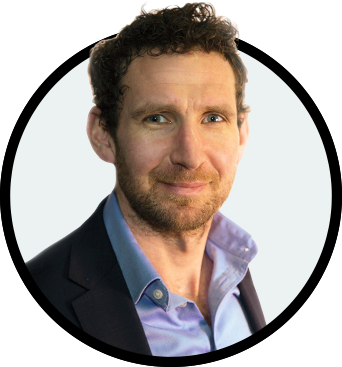“I was in this crawl space filled with crap. It was four-foot high and I was bent over shovelling mouse poop for six hours a day thinking: ‘How am I here?’”
Jason West’s triathlon career wasn’t exactly running to plan. Having moved to Boulder, Colorado, in 2015 as a national collegiate champion - sights initially set on the Rio Olympic Games and then readjusted for Tokyo - the early promise wasn’t translating into results.
The Penn State graduate had time to reassess his life choices when the Covid pandemic all but shut down professional racing in 2020, but first he needed to make some money. Personal training, thanks to his degree in kinesiology, plugged some of the shortfall, but supplementary income was hard to come by.
“Trying to find a job was impossible. So I was like, you know, just doing stupid stuff,” West explains. That extended to property clearance for a friend who stumped up $30 an hour.
“I cleaned out this house that was being sold by borderline hoarders. Six hours in a crawl space shovelling mouse poop. Sometimes I guess that’s what it takes. But I did end up with a kitchen aid mixer. It’s still in my kitchen, so that was a good perk.”
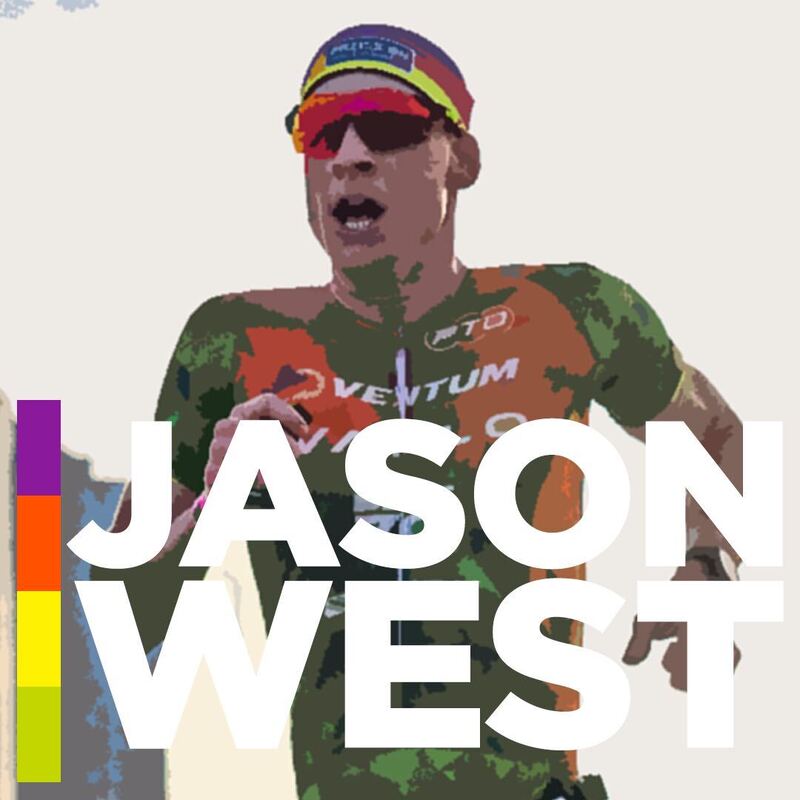
West’s experience helped him look outside the tunnel vision of professional sport, and rodent droppings apart, he liked what he saw. It showed that there was life beyond triathlon, and helped him understand that if he was to continue to swim, bike and run as the world opened up, it must be with a renewed sense of gratitude.
“Helping people taught me that I could be happy doing something else,” he says. “So, if I was going to continue to be an athlete, I'd do it because I loved it.”
Sliding doors
Jason's indirect route into pro sport also shows the fine margins between success and choosing another path. How close did West come to calling it a day?
“Very close. My career was always hard; a struggle to get by. Around 2018, I was at the point where I could quit my jobs and just train. I was like: ‘Okay, I'll never be back to that spot again.’ Then Covid threw me back into it. At times, it felt like a chore to train. I had to get back to a place where I was finding fulfilment.”
The turnaround has been remarkable. West had dabbled in non-drafting racing pre-pandemic, but now gave it his full focus. Two Ironman 70.3 wins in 2021 were backed up by two more the following year. And - handily, considering what’s up next - he also hit a rich seam of podiums in Clash races that utilised NASCAR race tracks.
Even if the trajectory was solid, 2023 was still unexpected to all but his close-knit team. West truly cut through, ending the year ranked No. 3 in the world according to the Professional Triathletes Organisation (PTO), and making the podium six times in seven races. Bookended by winning returns in Miami and Los Cabos, it was at the summer’s PTO Tour races where he not only boosted his bank balance by taking it to the best in the world over 100 kilometres, but cemented a reputation as the fastest runner in the field. If the current posterboys are Britain’s Alex Yee over the Olympic distance and Germany’s Patrick Lange at IRONMAN, then West can lay rightful claim to being the fleetest on two feet at the middle distance.
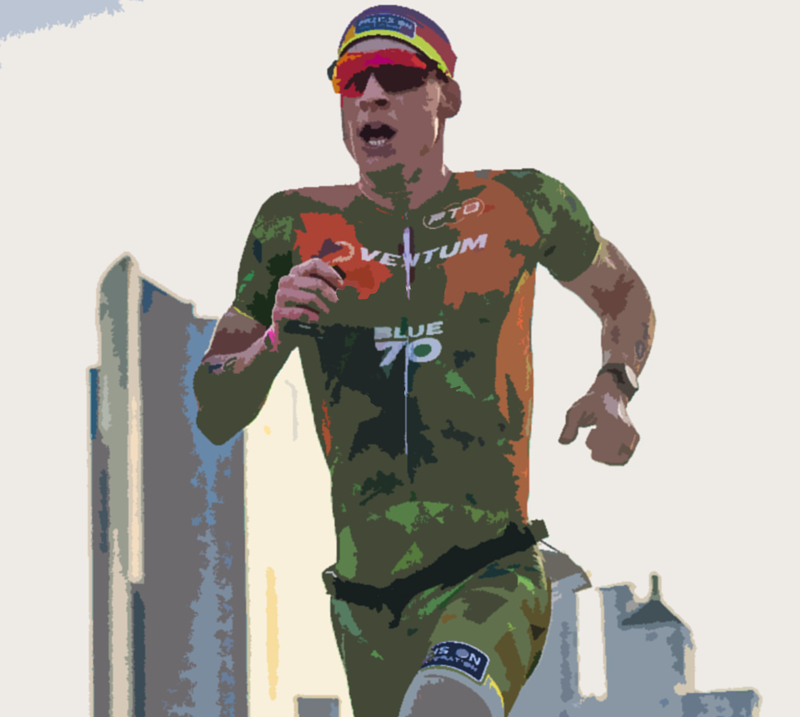
For context, in finishing runner-up to Jan Frodeno at the PTO US Open in Milwaukee, West put more than four-and-a-half minutes into the entire field over the 18 kilometre run leg. That’s approximately 15 seconds per kilometre or 25 seconds a mile - almost unfathomable at this elite level of competition. Perhaps it shouldn’t be a surprise that he stumbles when asked the last time he was overtaken on the run. “Um, I don’t know. I’d have to think.”
West has much to thank the PTO for. Its rise and his career path have been serendipitous: $95,000 in prize money from three events last year, plus another $80,000 from the end-of-year bonus pool, have led to an unconfirmed six-figure contract for the 2024 T100 series, where each of the eight events offers a $25,000 top prize and $210,000 for the newly crowned world champion.
No longer is pro tri chump change, but it’s also reciprocal value because West is the type of focused athlete that the PTO treasures. He doesn’t have the distractions of a full distance Ironman to factor into his year, and the IM 70.3 World Championship in New Zealand falls in December, a fortnight after his T100 work wraps up.
First up is Miami T100 on March 9, where as defending champion at the venue he's hoping his knowledge of the Homestead Speedway will help him slip into top gear. “We don't normally start our year with a world-class level race, but I'm confident I'll be ready and I've raced well there before,” he explains. “It's easy travel - just one short flight for us here in the US - and a good way to start the year.”
West plans to race seven of the eight T100 races, skipping the penultimate round in Dubai to stay fresh for the grand final in a yet-to-be announced location in the Middle East. With the new world champion to be crowned from the four best results and points-and-a-half on offer for the grand final, it's likely to come down to the wire.
It also looks wide open. Aged 30, resilient to injury, and looking as if his best is yet to come, West looks as strong a contender as anyone.
“I show up more ready to compete at a high level when I can consistently get training blocks in,” he says. “In the past, I wasn't in a position to do that, I had to race to pay the bills. Now there's more stability and I feel like I've earned the right to train more and race less, and hopefully be at my best more often.”
He’s not the only triathlete working out how to most effectively structure the season. “It's going to be interesting because you can't necessarily show up 100 percent every month,” he adds. “It doesn't work that way. With the T100 series going into late November, you have to slow play it a bit. But a lot of people will be in Miami because it makes sense to try to do well in the first part of the year, particularly if you are going long later.”
Fastest feet in the West
West believes the speedway circuit is nowhere near as benign as it initially appears. “The course is really hard. You wouldn't think that because the terrain is just super flat, but it’s very, very hot. The track temperature reaches 140° Fahrenheit (60°C) and you're baking without an ounce of shade. It's usually crazy windy too. The course goes through the infield a lot, so you're getting headwinds, tailwinds, and crosswinds. Come around a corner and it just nails you from the side and wants to throw you off the road. There's no reason to ever come out of your aero bars for the full 80 kilometres, but keeping the stability can start to flare your back up halfway through the ride, which rolls over on to the run.”
While it’s the final leg where West just seems to turn on Pac-Man mode and gobble up the opposition - even “staying psychologically engaged” by occasionally slapping himself in the face - the reality is a little more measured, especially when it comes to racing in Florida.
“I run at a pace I think I can hold in these conditions without getting to the finish feeling like I’ve left anything out there,” he says. “That can be difficult, especially when you have a world championship-strength field and everybody's throwing everything out there. Can I still take all that in and not get ahead of myself? I have to eliminate as much ego as I can and race super smart.
“There are races where I don't pull back that much time in the first five kilometres, but I know I'm pacing properly. I'm a pretty big numbers guy and I have to trust that statistically people haven’t run that fast and will start falling apart. But I'm also good at assessing how I'm feeling. Last year, I took a mile where I slowed, tried to get more nutrition, and dumped as much water on myself as possible, before I made my final push.”
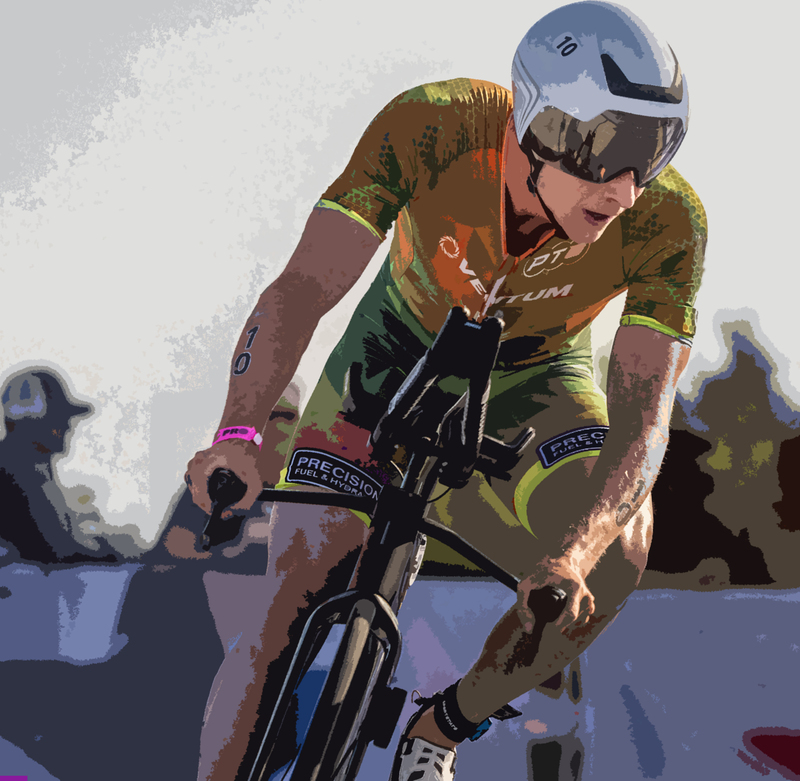
At least West is well schooled when it does turn into a war of attrition. Brought up as the youngest of four brothers, his early competitive sport was grappling on the wrestling mats of Pennsylvania. “That area is the hotbed for it in the US. It’s rooted in the culture,” he explains, and the similarities extend beyond the spandex.
“Wrestling teaches you a lot about resilience. You have to be gritty, enjoy hard work and endure. It’s me versus you and there's nobody there to help us. The difference is the type of pain. In triathlon, you spend the whole time tired and hungry. In wrestling, you're getting your head smashed into the ground.”
West looks to have gotten to grips with the PTO's relatively new 100km distance as well as any athlete and is enjoying the challenge. “It's just the most honest racing I've ever done,” he says, acknowledging the 20-metre drafting rule in play (demanding bigger gaps are left between cyclists unless they're overtaking). “There's no hiding throughout the whole race. You have to ride hard and our average power numbers are probably a lot higher than they are in most races. I think that’s why you see a lot of blow-ups on the run.”
Go, West
As for his chances in 2024?
“I don't necessarily have an expectation of the result. If I have the best race of my life, and come seventh, I need to continue to get better. If I have the best race of my life, and win, that's great, but I'm probably going to keep needing to get better because everybody else is going to keep improving.”
The one flicker that might have disrupted that focus, a bucket-list trip to Paris for the Olympic Games, now looks to be snuffed out. Having not raced a World Triathlon event since before the pandemic, it wasn’t even a consideration until West piqued attention by choosing to travel to Rome and then Brasilia for World Cups (the second tier of elite racing) in October.
A fifth place in the latter showed potential, but with few qualification points and eight US men above him in the rankings, his chances of getting a winner-take-all pot-shot at Yokohama in May now look remote. Not that it wouldn’t add interest. There isn’t a T100 race that month and Olympic qualification can take a curious path. Just ask Morgan Pearson, who was only on standby for the Paris test event the day before he became USA’s first and to date only automatically qualified male last August.
“If they would give me a start in Yokohama, I would probably go,” West muses. “I think it would take a podium to auto qualify for the US, and I’d probably have to do that just to get Olympic-eligible anyway, but it’s a course that generally makes it a runner's race. Usually it's a pack of 40 or 50 guys off the bike and then it's a 10 kilometre run and that would probably suit me quite well. The thing about the Olympics is that it's all about medals, right? They might take an athlete who has a 10 per cent chance of winning a medal on the right day over somebody who's consistently sixth, but never on the podium.”
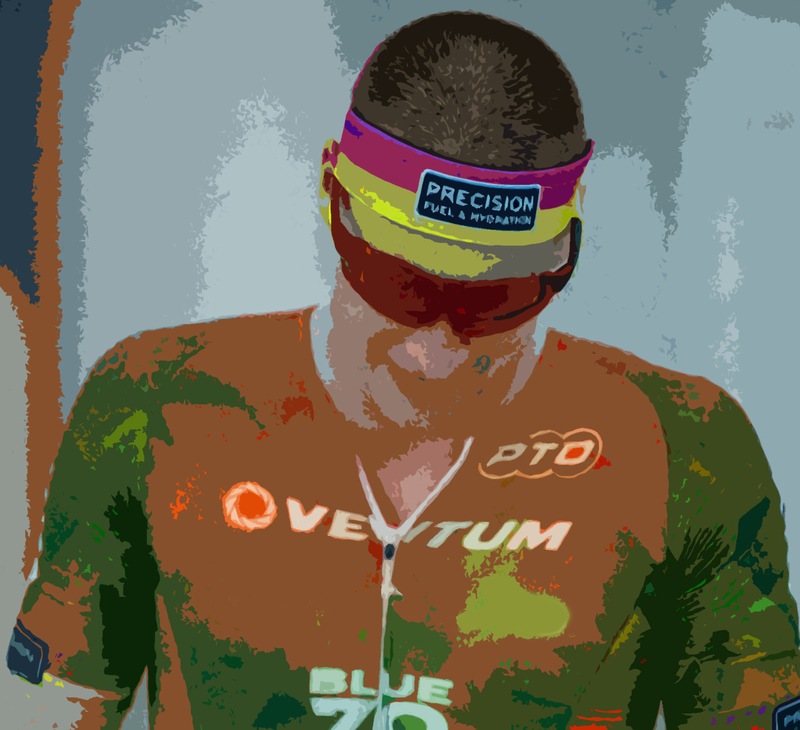
West competed over 40 times in elite short course racing, and while he stood atop the podium on seven occasions, all in continental cups in the Americas, when it came to matching up to the best in the World Series (WTCS) - the Brownlee brothers in Leeds, or Spain’s Mario Mola on his way to a first world title in Abu Dhabi - he came up short. It’s another example of how sporting careers, even in races that last for the best part of two hours, can be decided by fractions.
“I just never had the swim to get the job done,” is his honest reflection. “At WTCS level, I just wasn't quick enough to make that split. That’s all there is to it.” He believes it’s a lot different now, not least because his swim coach is his wife Jessica Broderick, a former pro triathlete and technical swim specialist.
So, ructions on the pool deck when he’s not hitting his straps? Not really. “Sometimes I just need to be told,” West says with a smile. Thankfully, there’s little to grumble about. “I think I'm a lot better of a swimmer now,” he continues. “I've developed a lot more and if I truly went back and said I want to go all-in on this [short course racing] I do think I could have success. But it's probably not the lifestyle I want to live, and I'm happy doing what I'm doing.”
He's also happy to control his overall programme, relying on his sports science background and inputs from various coaches over the years. And Broderick is always available to give a sense-check on overall fatigue. “I know myself well, can be objective and don’t make emotional decisions,” he says. Sometimes that can mean knowing when to lay off, and other times to push through, such as travelling to Los Cabos in November where, although tired, he was able to secure IM 70.3 World Championship qualification for 2024.
Former professional rider turned coach, Nate Wilson, has helped guide the cycling transformation from damage limitation on the bike leg to riding into contention.
West still recalls his first middle distance races in 2019, including a sixth place finish in Indian Wells where he ceded 12 minutes to Canadian Lionel Sanders on the 90km bike leg. “That was a rough one. I went through a patch where I just couldn’t ride my bike and remember my butt getting kicked that day. I had to get to work, commit to being a cyclist and figure it out or it wouldn’t matter how fast I ran.”
Ultimately, as he learnt during the pandemic, the worth of what West achieves won’t be measured by money, but by mindset. “I describe it as a spiral, and when you get on the wrong side of that spiral, it gets really bad, really, really quickly,” he says. “When you get on the right side of that spiral, all of a sudden everything feels easier and the next piece is even easier to execute than the previous piece. You’ve just got to get the ball rolling the right way.
“Earlier in my career, while I always had a lot of belief in myself, I had the ball rolling the wrong way. I just don't think I was necessarily in the same place mentally or just in life to have the confidence to go out and perform as I do now. I'd love to go back and maybe improve some things, but things have turned out alright.”
